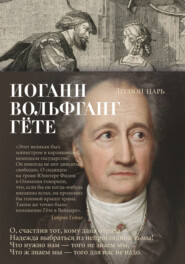По всем вопросам обращайтесь на: info@litportal.ru
(©) 2003-2024.
✖
Wilhelm Meister's Apprenticeship and Travels, Vol. I (of 2)
Настройки чтения
Размер шрифта
Высота строк
Поля
When the huntsman was gone, Philina signified that he had left with her a purse of twenty louis-d'or; that he had given the parson a remuneration for their lodging, and left with him money to defray the surgeon's bill when the cure should be completed. She added, that she herself passed everywhere for Wilhelm's wife; that she now begged leave to introduce herself once for all to him in this capacity, and would not allow him to look out for any other sick-nurse.
"Philina," said Wilhelm, "in this disaster that has overtaken us, I am already deeply in your debt, for kindness shown me; and I should not wish to see my obligations increased. I am uneasy so long as you are about me, for I know of nothing by which I can repay your labor. Give me what things of mine you have saved in your trunk; join the rest of the company; seek another lodging; take my thanks, and the gold watch as a small acknowledgment: only leave me; your presence disturbs me more than you can fancy."
She laughed in his face when he had ended. "Thou art a fool," she said: "thou wilt not gather wisdom. I know better what is good for thee: I will stay, I will not budge from the spot. I have never counted on the gratitude of men, and therefore not on thine; and, if I have a touch of kindness for thee, what hast thou to do with it?"
She staid accordingly, and soon wormed herself into favor with the parson and his household; being always cheerful, having the knack of giving little presents, and of talking to each in his own vein; at the same time always contriving to do exactly what she pleased. Wilhelm's state was not uncomfortable: the surgeon, an ignorant but not unskilful man, let nature have sway; and the patient was soon on the road to recovery. For such a consummation he vehemently longed, being eager to pursue his plans and wishes.
Incessantly he kept recalling that event, which had made an ineffaceable impression on his heart. He saw the beautiful Amazon again come riding out of the thickets: she approached him, dismounted, went to and fro, and strove to serve him. He saw the garment she was wrapped in fall down from her shoulders: he saw her countenance, her figure, vanish in their radiance. All the dreams of his youth now fastened on this image. Here he conceived he had at length beheld the noble, the heroic, Clorinda with his own eyes; and again he bethought him of that royal youth, to whose sick-bed the lovely, sympathizing princess came in her modest meekness.
"May it not be," said he often to himself in secret, "that, in youth as in sleep, the images of coming things hover round us, and mysteriously become visible to our unobstructed eyes? May not the seeds of what is to betide us be already scattered by the hand of Fate? may not a foretaste of the fruits we yet hope to gather possibly be given us?"
His sick-bed gave him leisure to repeat those scenes in every mood. A thousand times he called back the tone of that sweet voice: a thousand times he envied Philina, who had kissed that helpful hand. Often the whole incident appeared before him as a dream; and he would have reckoned it a fiction, if the white surtout had not been left behind to convince him that the vision had a real existence.
With the greatest care for this piece of apparel, he combined the most ardent wish to wear it. The first time he arose, he put it on, and was kept in fear all day lest it might be hurt by some stain or other injury.
CHAPTER X
Laertes visited his friend. He had not been present during that lively scene at the inn, being then confined to bed in an upper chamber. For his loss he was already in a great degree consoled: he helped himself with his customary, "What does it signify?" He detailed various laughable particulars about the company; particularly charging Frau Melina with lamenting the loss of her stillborn daughter, solely because she herself could not on that account enjoy the Old-German satisfaction of having a Mechthilde christened. As for her husband, it now appeared that he had been possessed of abundant cash, and even at first had by no means needed the advances which he had cajoled from Wilhelm. Melina's present plan was, to set off by the next post-wagon, and he meant to require of Wilhelm an introductory letter to his friend, Manager Serlo, in whose company, the present undertaking having gone to wreck, he now wished to establish himself.
For some days Mignon had been singularly quiet: when pressed with questions, she at length admitted that her right arm was out of joint. "Thou hast thy own folly to thank for that," observed Philina, and then told how the child had drawn her sword in the battle, and, seeing her friend in peril, had struck fiercely at the freebooters, one of whom had at length seized her by the arm, and pitched her to a side. They chid her for not sooner speaking of her ailment; but they easily saw that she was apprehensive of the surgeon, who had hitherto looked on her as a boy. With a view to remove the mischief, she was made to keep her arm in a sling, which arrangement, too, displeased her; for now she was obliged to surrender most part of her share in the management and nursing of our friend to Philina. That pleasing sinner but showed herself the more active and attentive on this account.
One morning, on awakening, Wilhelm found himself strangely near to her. In the movements of sleep, he had hitched himself quite to the back of the spacious bed. Philina was lying across from the front part of it: she seemed to have fallen asleep on the bed while sitting there and reading. A book had dropped from her hand: she had sunk back; and her head was lying near his breast, over which her fair and now loosened hair was spread in streams. The disorder of sleep enlivened her charms more than art or purpose could have done: a childlike smiling rest hovered on her countenance. He looked at her for a time, and seemed to blame himself for the pleasure this gave him. He had viewed her attentively for some moments, when she began to awake. He softly closed his eyes, but could not help glimmering at her through his eyelashes, as she trimmed herself again, and went away to see about breakfast.
All the actors had at length successively announced themselves to Wilhelm; asking introductory letters, requiring money for their journey with more or less impatience and ill-breeding, and constantly receiving it, against Philina's will. It was in vain for her to tell our friend that the huntsman had already left a handsome sum with these people, and that accordingly they did but cozen him. To these remonstrances he gave no heed: on the contrary, the two had a sharp quarrel about it; which ended by Wilhelm signifying, once for all, that Philina must now join the rest of the company, and seek her fortune with Serlo.
For an instant or two she lost temper; but, speedily recovering her composure, she cried, "If I had but my fair-haired boy again, I should not care a fig for any of you." She meant Friedrich, who had vanished from the scene of battle, and never since appeared.
Next morning Mignon brought news to the bedside, that Philina had gone off by night; leaving all that belonged to Wilhelm very neatly laid out in the next room. He felt her absence; he had lost in her a faithful nurse, a cheerful companion; he was no longer used to be alone. But Mignon soon filled up the blank.
Ever since that light-minded beauty had been near the patient with her friendly cares, the little creature had by degrees drawn back, and remained silent and secluded in herself; but, the field being clear once more, she again came forth with her attentions and her love, again was eager in serving, and lively in entertaining, him.
CHAPTER XI
Wilhelm was rapidly approaching complete recovery: he now hoped to be upon his journey in a few days. He proposed no more to lead an aimless routine of existence: the steps of his career were henceforth to be calculated for an end. In the first place, he purposed to seek out that beneficent lady, and express the gratitude he felt to her; then to proceed without delay to his friend the manager, that he might do his utmost to assist the luckless company; intending, at the same time, to visit the commercial friends whom he had letters for, and to transact the business which had been intrusted to him. He was not without hope that fortune, as formerly, would favor him, and give him opportunity, by some lucky speculation, to repair his losses, and fill up the vacuity of his coffer.
The desire of again beholding his beautiful deliverer augmented every day. To settle his route, he took counsel with the clergyman, – a person well skilled in statistics and geography, and possessing a fine collection of charts and books. They two searched for the place which this noble family had chosen as their residence while the war continued: they searched for information respecting the family itself. But their place was to be found in no geography or map, and the heraldic manuals made no mention of their name.
Wilhelm grew uneasy; and, having mentioned the cause of his anxiety, the harper told him he had reason to believe that the huntsman, from whatever motive, had concealed the real designations.
Conceiving himself now to be in the immediate neighborhood of his lovely benefactress, Wilhelm hoped he might obtain some tidings of her if he sent out the harper; but in this, too, he was deceived. Diligently as the old man kept inquiring, he could find no trace of her. Of late days a number of quick movements and unforeseen marches had taken place in that quarter; no one had particularly noticed the travelling party; and the ancient messenger, to avoid being taken for a Jewish spy, was obliged to return, and appear without any olive-leaf before his master and friend. He gave a strict account of his conduct in this commission, striving to keep far from him all suspicions of remissness. He endeavored by every means to mitigate the trouble of our friend; bethought him of every thing that he had learned from the huntsman, and advanced a number of conjectures; out of all which, one circumstance at length came to light, whereby Wilhelm could explain some enigmatic words of his vanished benefactress.
The freebooters, it appeared, had lain in wait, not for the wandering troop, but for that noble company, whom they rightly guessed to be provided with store of gold and valuables, and of whose movements they must have had precise intelligence. Whether the attack should be imputed to some free corps, to marauders, or to robbers, was uncertain. It was clear, however, that, by good fortune for the high and rich company, the poor and low had first arrived upon the place, and undergone the fate which was provided for the others. It was to this that the lady's words referred, which Wilhelm yet well recollected. If he might now be happy and contented, that a prescient Genius had selected him for the sacrifice, which saved a perfect mortal, he was, on the other hand, nigh desperate, when he thought that all hope of finding her and seeing her again was, at least for the present, completely gone.
What increased this singular emotion still further, was the likeness which he thought he had observed between the countess and the beautiful unknown. They resembled one another as two sisters may, of whom neither can be called the younger or the elder, for they seem to be twins.
The recollection of the amiable countess was to Wilhelm infinitely sweet. He recalled her image but too willingly into his memory. But anon the figure of the noble Amazon would step between: one vision melted and changed into the other, and the form of neither would abide with him.
A new resemblance – the similarity of their handwritings – naturally struck him with still greater wonder. He had a charming song in the countess's hand laid up in his portfolio; and in the surtout he had found a little note, inquiring with much tender care about the health of an uncle.
Wilhelm was convinced that his benefactress must have penned this billet; that it must have been sent from one chamber to another, at some inn during their journey, and put into the coat-pocket by the uncle. He held both papers together; and, if the regular and graceful letters of the countess had already pleased him much, he found in the similar but freer lines of the stranger a flowing harmony which could not be described. The note contained nothing; yet the strokes of it seemed to affect him, as the presence of their fancied writer once had done.
He fell into a dreamy longing; and well accordant with his feelings was the song which at that instant Mignon and the harper began to sing, with a touching expression, in the form of an irregular duet.
"'Tis but who longing knows,
My grief can measure.
Alone, reft of repose,
All joy, all pleasure,
I thither look to those
Soft lines of azure.
Ah! far is he who knows
Me, and doth treasure.
I faint, my bosom glows
'Neath pain's sore pressure.
'Tis but who longing knows,
My grief can measure."
– Editor's Version.
CHAPTER XII
The soft allurements of his dear presiding angel, far from leading our friend to any one determined path, did but nourish and increase the unrest he had previously experienced. A secret fire was gliding through his veins: objects distinct and indistinct alternated within his soul, and awoke unspeakable desire. At one time he wished for a horse, at another for wings; and not till it seemed impossible that he could stay, did he look round him to discover whither he was wanting to go.
The threads of his destiny had become so strangely entangled, he wished to see its curious knots unravelled, or cut in two. Often when he heard the tramp of a horse, or the rolling of a carriage, he would run to the window, and look out, in hopes it might be some one seeking him, – some one, even though it were by chance, bringing him intelligence and certainty and joy. He told stories to himself, how his friend Werner might visit these parts, and come upon him; how, perhaps, Mariana might appear. The sound of every post's horn threw him into agitation. It would be Melina sending news to him of his adventures: above all, it would be the huntsman coming back to carry him to the beauty he worshipped.
Of all these possibilities, unhappily no one occurred: he was forced at last to return to the company of himself; and, in again looking through the past, there was one circumstance which, the more he viewed and weighed it, grew the more offensive and intolerable to him. It was his unprosperous generalship, of which he never thought without vexation. For although, on the evening of that luckless day, he had produced a pretty fair defence of his conduct when accused by the company, yet he could not hide from himself that he was guilty. On the contrary, in hypochondriac moments, he took the blame of the whole misfortune.
Self-love exaggerates our faults as well as our virtues. Wilhelm though the had awakened confidence in himself, had guided the will of the rest; that, led by inexperience and rashness, they had ventured on, till a danger seized them, for which they were no match. Loud as well as silent reproaches had then assailed him; and if, in their sorrowful condition, he had promised the company, misguided by him, never to forsake them till their loss had been repaid with usury, this was but another folly for which he had to blame himself, – the folly of presuming to take upon his single shoulders a misfortune that was spread over many. One instant he accused himself of uttering this promise, under the excitement and the pressure of the moment; the next, he again felt that this generous presentation of his hand, which no one deigned to accept, was but a light formality compared with the vow his heart had taken. He meditated means of being kind and useful to them: he found every cause conspire to quicken his visit to Serlo. Accordingly he packed his things together; and without waiting his complete recovery, without listening to the counsel of the parson or of the surgeon, he hastened, in the strange society of Mignon and the harper, to escape the inactivity in which his fate had once more too long detained him.
CHAPTER XIII
Serlo received him with open arms, crying as he met him, "Is it you? Do I see you again? You have scarcely changed at all. Is your love for that noblest of arts still as lively and strong? So glad am I at your arrival, that I even feel no longer the mistrust your last letters had excited in me."
Wilhelm asked with surprise for a clearer explanation.
"You have treated me," said Serlo, "not like an old friend, but as if I were a great lord, to whom with a safe conscience you might recommend useless people. Our destiny depends on the opinion of the public; and I fear Herr Melina and his suite can hardly be received among us."
Wilhelm tried to say something in their favor; but Serlo began to draw so merciless a picture of them, that our friend was happy when a lady came into the room, and put a stop to the discussion. She was introduced to him as Aurelia, the sister of his friend; she received him with extreme kindness; and her conversation was so pleasing, that he did not even remark a shade of sorrow visible on her expressive countenance, to which it lent peculiar interest.
For the first time during many months, Wilhelm felt once more in his proper element. Of late in talking, he had merely found submissive listeners, and even these not always; but now he had the happiness to speak with critics and artists, who not only fully understood him, but repaid his observations by others equally instructive. With wonderful vivacity they travelled through the latest plays, with wonderful correctness judged them. The decisions of the public they could try and estimate: they speedily threw light on each other's thoughts.
Loving Shakspeare as our friend did, he failed not to lead round the conversation to the merits of that dramatist. Expressing, as he entertained, the liveliest hopes of the new epoch which these exquisite productions must form in Germany, he erelong introduced his "Hamlet," which play had busied him so much of late.
Serlo declared that he would long ago have represented the play, had it at all been possible, and that he himself would willingly engage to act Polonius. He added, with a smile, "An Ophelia, too, will certainly turn up, if we had but a Prince."
Wilhelm did not notice that Aurelia seemed a little hurt at her brother's sarcasm. Our friend was in his proper vein, becoming copious and didactic, expounding how he would have "Hamlet" played. He circumstantially delivered to his hearers the opinions we before saw him busied with; taking all the trouble possible to make his notion of the matter acceptable, sceptical as Serlo showed himself regarding it. "Well, then," said the latter finally, "suppose we grant you all this, what will you explain by it?"
"Much, every thing," said Wilhelm. "Conceive a prince such as I have painted him, and that his father suddenly dies. Ambition and the love of rule are not the passions that inspire him. As a king's son, he would have been contented; but now he is first constrained to consider the difference which separates a sovereign from a subject. The crown was not hereditary; yet his father's longer possession of it would have strengthened the pretensions of an only son, and secured his hopes of succession. In place of this, he now beholds himself excluded by his uncle, in spite of specious promises, most probably forever. He is now poor in goods and favor, and a stranger in the scene which from youth he had looked upon as his inheritance. His temper here assumes its first mournful tinge. He feels that now he is not more, that he is less, than a private nobleman; he offers himself as the servant of every one; he is not courteous and condescending, he is needy and degraded.

















